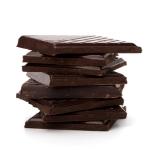Can Consumers Count on Dark Chocolate Labeled 'Dairy-Free' to be Devoid of Milk?
This entry was posted on June 01, 2015 .

'Dairy-Free' Doesn't Always Mean What Consumers Think, FDA Investigation Finds For individuals who are allergic to dairy, ingesting milk chocolate is an obvious no-no. That being said, people who have a sweet tooth shouldn't despair, as dark chocolate is a delicious and often dairy-free alternative… or is it?
According to Food Allergy Research and Education, milk is one of the eight foods that account for 90 percent of allergic reactions in this country, alongside eggs, peanuts, tree nuts, soy, wheat, fish and shellfish. Because dairy allergies are so prevalent and the effects so extreme (the worst-case scenario is anaphylaxis, which can lead to death), federal regulations are in place that require all food items containing milk to indicate this fact on their product labels. However, a recent investigation conducted by the Food and Drug Administration revealed many dark chocolate products that don't list milk on their labels actually do contain it. Not only does this contravene the law, but it also poses a very real threat to consumers with dairy allergies who are led to mistakenly believe the items are safe for them to eat.
According to an FDA Consumer Update, the agency tested 94 bars of dark chocolate, 88 of which did not list milk on their ingredient labels, and found that dairy was present in nearly two-thirds of the products. So, why the massive discrepancy between labels and reality?
"Milk can get into a dark chocolate product even when it is not added as an ingredient," the FDA report explained. "Most dark chocolate is produced on equipment that is also used to produce milk chocolate. In these cases, it is possible that traces of milk may inadvertently wind up in the dark chocolate."
Reading Between the Lines Fifty-nine of the 94 dark chocolate products tested featured advisory statements on their labels that pertained to the possible presence of milk, such as "may contain traces of dairy" or "manufactured in a facility that uses milk." Of these, 75 percent tested positive for milk, leading the FDA to conclude that "may" should be read as "likely," an assertion with which a spokesperson from the National Confectioners Association agreed.
"Consumers with milk allergies should not consume dark chocolate products that come with advisory statements," the NCA representative said, as quoted in the FDA's report.
The same advice also goes for individuals who choose to avoid animal products altogether and adhere to a vegan diet. In short, concluded Roberto Ferdman, a reporter for The Washington Post's Wonkblog, "Don't believe the label."
4 Steps for Safer Chocolate Evaluation and Consumption Although truly dairy-free dark chocolate items are few and far between, they do exist. These types of products are safe for vegans and people with dairy allergies to eat - but how can consumers separate the wheat from the chaff? The FDA offered four points of advice.
- Gauge the severity of the allergy or sensitivity. Chocolate is one of the most common sources of undeclared milk associated with all consumer reactions that are reported to the FDA, so individuals who are highly allergic to dairy are better off avoiding dark chocolate altogether.
- Check the ingredients list. Although most of the bars tested by the FDA did not include milk in their panels of ingredients, six did, so it's always good to check.
- Examine the packaging for advisory statements. Some labels contradict themselves by claiming that products are dairy-free or vegan - and usually prominently displaying these words - while simultaneously warning consumers that the items may contain traces of milk. These advisory statements are typically printed in small letters that can be easily missed unless people are specifically looking for them.
- Approach with caution. Although some chocolatiers use separate manufacturing equipment to ensure their milk-free products actually are devoid of dairy, many don't. Unless a manufacturer is a trusted source, it's best - and safest - for highly allergic consumers and strict vegans to steer clear.
It remains to be seen how the FDA will address the food labeling inconsistencies seen on many dark chocolate bars, but in the meantime, vegans and consumers with allergies should tread carefully and companies should strive to present accurate information about their products.
Request your FREE instant quote today.

 Custom Labels
Custom Labels  Custom Beverage Labels
Custom Beverage Labels  Custom Lip Balm Labels
Custom Lip Balm Labels  Custom Warning & Safety Labels
Custom Warning & Safety Labels  Perfume Bottle Labels
Perfume Bottle Labels  Bumper Stickers
Bumper Stickers  Custom Prop 65 Warning Labels
Custom Prop 65 Warning Labels  Custom Stickers
Custom Stickers